It’s 5 p.m. on a scorching Thursday afternoon. Craft vendor Barry Allen has made one sale today: a key ring, for less than $4. Allen peddles on Winnifred Beach, one of a few beaches in Portland Parish that the public can use without paying. He lowers and folds the unsold T-shirts hanging in his stall, carefully placing each in a transparent plastic bag. At 58 years old, he has performed this afternoon ritual for more than three decades. Despite the job’s scant rewards, it has enabled him to send both his daughters to nearby public high schools
So when the Jamaican government threatened the vendors’ access to the beach, he decided to fight, he says.
Brave the potholed main pathway to Winnifred and eventually you enter a tranquil hideaway. But the beach’s white sand, verdant foliage, and still, clear water belie the seven-year legal battle that ensured that Fairy Hill community residents and visitors can use the property as they wish.
Cynthia Miller, who has sold food on the beach for 22 years, remembers the first signs of trouble back in 2007.
“They gave us notice that we should demolish our buildings and leave the beach. They were handing out envelopes. I personally throw mines in the fire. I’m saying, ‘It is a public beach. If we demolish our buildings, we have nothing to get from UDC.” The UDC, or Urban Development Corporation, is the government entity the vendors alleged moved to evict them.
Five longtime residents filed a complaint against the UDC that year, with pro bono help from two Jamaican lawyers.
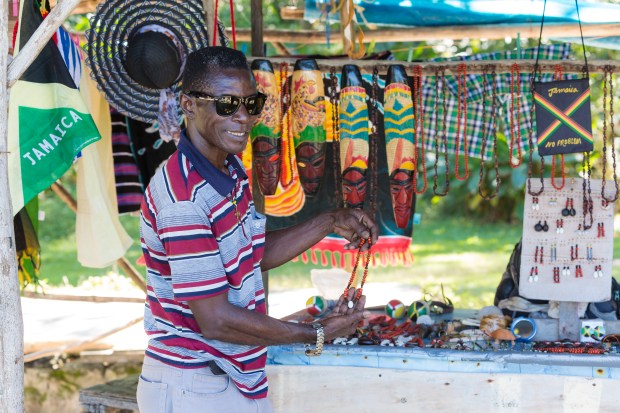
Yvonne Ridguard, a Portland-based attorney who represented the community residents, explains that Winnifred is unique because it was willed to the community but is now owned by the government. “When the UDC came to the beach, the people had to assert their right to use it,” she says.
Allen and Miller say the UDC blocked certain pathways to the beach, including trails fishermen had been using for decades. And Ridguard insists that she saw development plans, presented to the community by the UDC, that included building a hotel on the land by the beach. The beach’s most frequent local users rejected this idea, because it could compromise their ability to enter the beach without paying.
“The proposed development that UDC envisioned was not in keeping with what the local people wanted the beach to be. Here is an entity set up to take care of the interests of the people, and they are not listening to what people want,” Ridguard says.
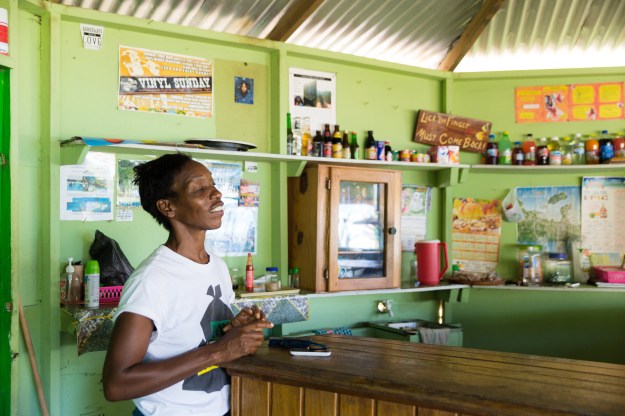
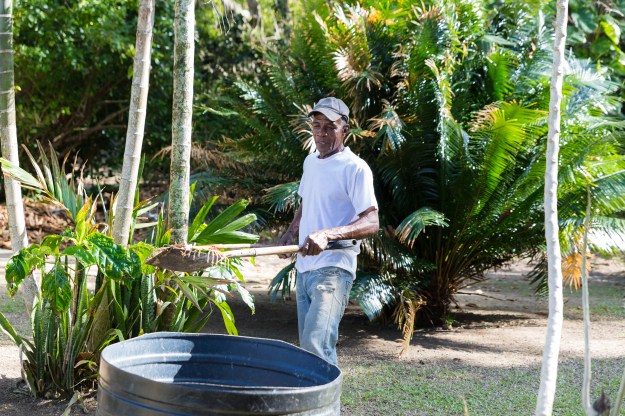
What visitors know as Winnifred Beach is a small part of a property spanning hundreds of acres. In 1918 Baptist missionary Frederick Barnet Brown willed the estate to his wife. He mandated that once she died, the property be used as a rest home for missionaries, teachers, and the poor. In essence Brown willed his property to the Fairy Hill community. He established a trust to administer his estate, but the group failed to do so consistently. As a result, Jamaica’s attorney general became the sole trustee of his will in 1938. Most of the property, including Winnifred Beach, was sold to the UDC in 1972.
Although the UDC is the owner of the estate, one legal loophole became the basis of the community’s defence. Ridguard says Italian immigrant Maria Carla Gullotta was the linchpin in the community’s resistance efforts.
Gullotta moved to Drapers in 1989, and she and her children became weekly visitors to Winnifred Beach. She became friendly with other regulars, and they became aware of her work as a human rights activist.
“When the UDC hanged up a notice on the beach, they came to me and said that the UDC was noticing them that they should evacuate the beach in two weeks, and they were quite desperate,” Gullotta says.
Gullotta reached out to a friend who was a former chairman of the National Resources Conservation Authority and Beach Control Authority, who told her that according to Jamaica’s Prescription Act, citizens who had been using Winnifred as a public beach for over 20 years had an indefeasible right to continue to do so. Gullotta and two allies found residents who met the criteria and recorded their testimonies to file a plaint.
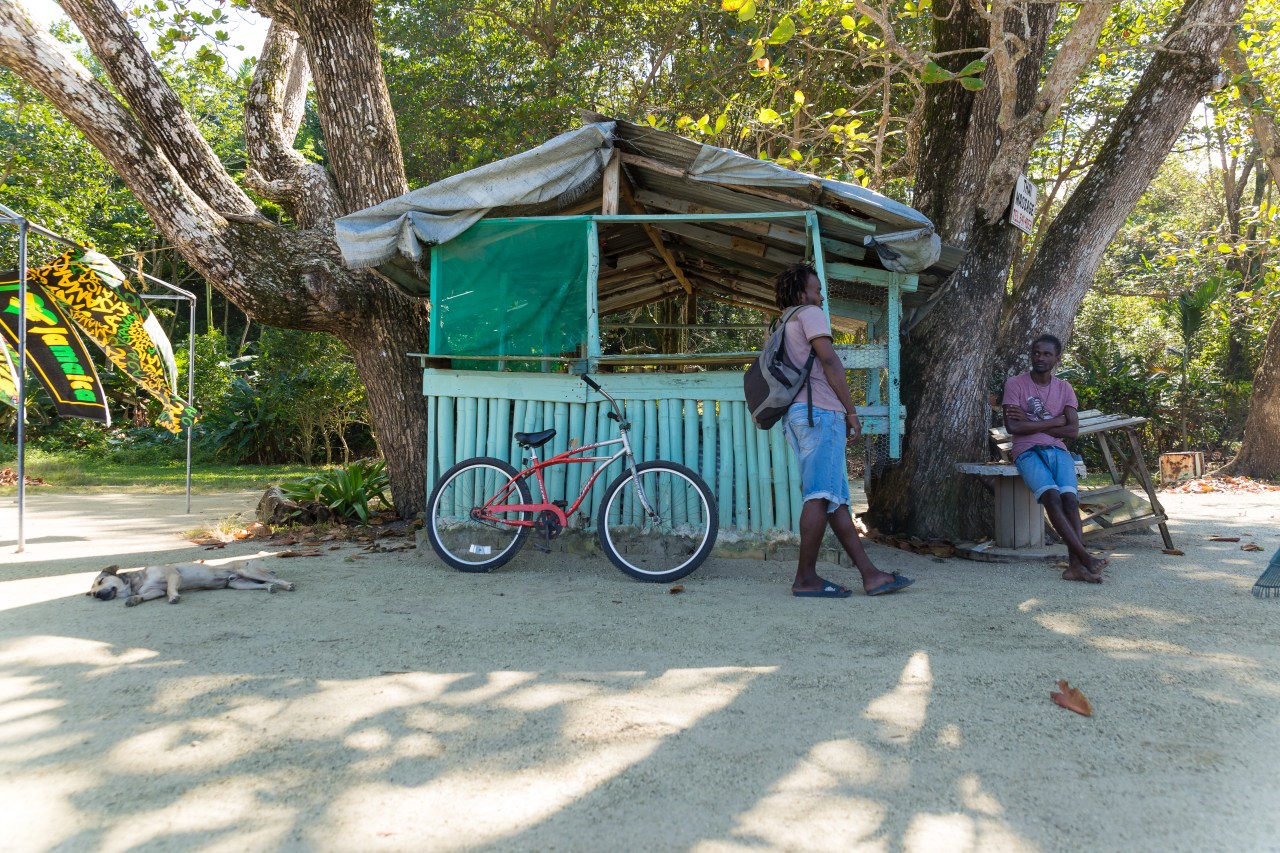
Next, Danielle Andrade, a Kingston-based lawyer at conservation nongovernmental organization the Jamaica Environment Trust, helped Gullotta form the Winnifred Beach Benevolent Society to legally organize their movement. Gullotta became the president and Miller the vice president. Once the plaint was filed, the UDC and the five complainants, backed by the society, agreed to mediation.
Several attempts and seven years later, middle ground was reached. On October 6, 2014, the agreement was sanctioned by an official order from the Port Antonio Resident Magistrates Court. The UDC was ordered to apply for a separate title for Winnifred Beach and the lands to access it and to create on the new title an easement (or special right) for public access for bathing and recreational purposes.
The Brown estate now has two titles. The UDC still owns Winnifred Beach, and the community has a right to use it forever regardless of who owns it. Another issue looms, however: whether the community will one day be required to pay to use the beach. Winnifred is one of just a few on the island that does not charge for access.
When contacted by CNN, the UDC said that it is supportive of the 2014 court order.
“Public access has never been an issue for the corporation, which has never denied anyone access to the beach since the property was acquired. The order does not say that access to the beach should be free.”
The UDC did not respond to a follow-up question about whether vendors were ever given eviction notices.
In a position statement on beach access in Jamaica, published on its website in early 2017, the corporation argued that at many of the island’s public beaches it undertakes operational activities, such as cleaning and providing lifeguards, for which it charges “nominal fees.”
It costs JM$250 (about $2) to enter Fort Clarence Beach in St. Catherine Parish. For a beach vendor like Allen who goes to the beach every day, the monthly expense could easily exceed JM$4,000 ($32). Families who like to use the beach would often face the same problem.
Miller says representatives of the UDC came to the beach twice recently. “They are saying that they are going to start the process of fixing the road, but they need to have a meeting with the community.” She is grateful but worried. She fears that if the UDC fixes the road, it could lease the beach or ask the community to pay access fees. Miller would prefer that the community and the UDC co-manage the beach, preserving community members’ and visitors’ free access while creating the option to donate to beach upkeep.
The UDC says they do not have an adversarial relationship with the Fairy Hill community, and they are looking forward to working cooperatively to develop Winnifred Beach.
Ridguard is less optimistic about the organization’s intentions.
“For people in the community to be fighting against UDC, that is the irony. They are doing what they have to, but they have not bought into the people’s vision. They don’t consider open spaces or places of recreation as important for the well-being of the average person. And to me, that is critical.”
She wishes the UDC would supply the beach with functioning bathrooms, water, and other amenities and allow community members to manage it.
“Sometimes if you don’t give people a chance, you won’t know what they can do.”
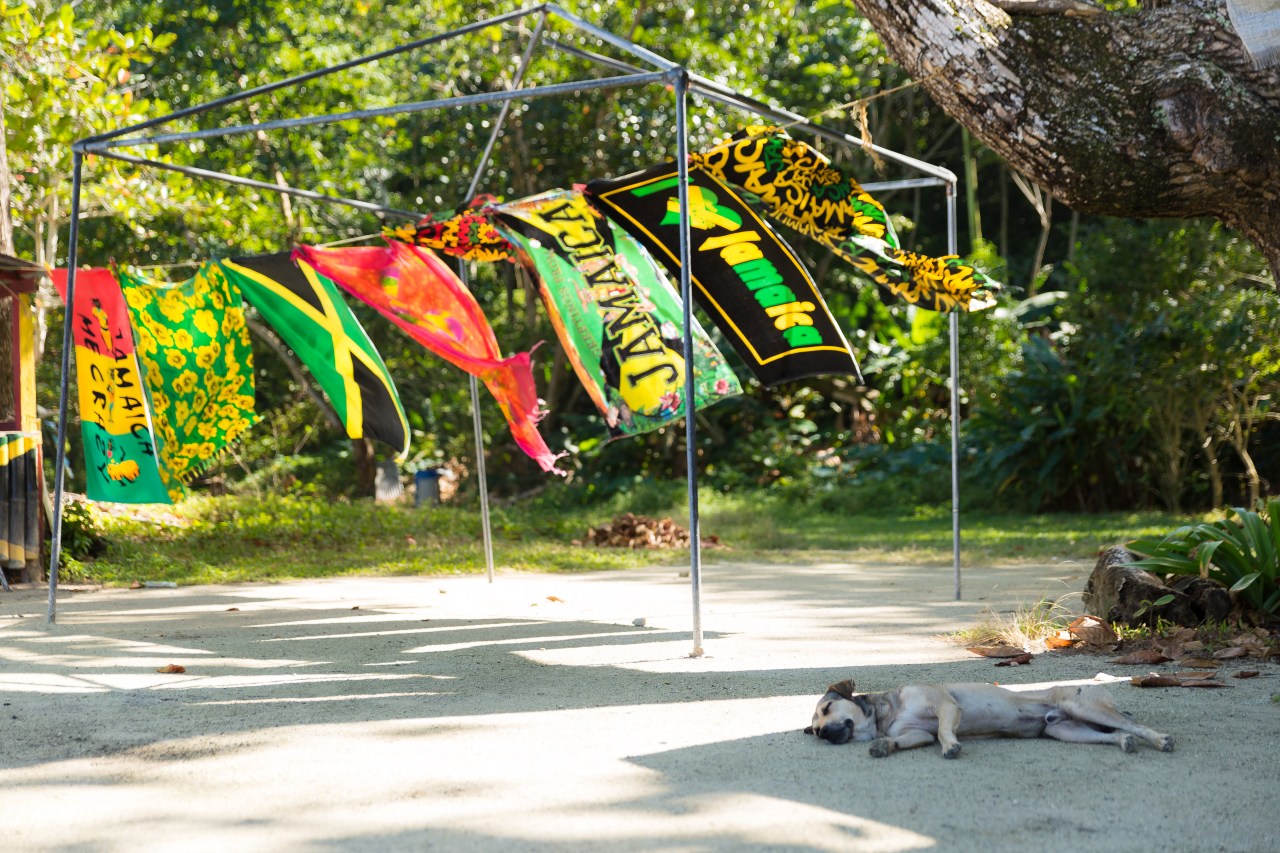
If you go to Winnifred Beach, you immediately see why it doesn’t attract more tourists. Most taxi drivers refuse to take visitors down the access road to the beach, citing the blows the potholed road will deal to their vehicles. Meanwhile, it takes at least 15 minutes to walk it. Because the road is surrounded by thick bushes, it isn’t safe after dark. There is also no electricity or lighting on the beach. When night falls quickly, closer to the end of the year, vendors and visitors pack up and leave promptly around 5 p.m.
No water supply means vendors who prepare food must bring water in huge plastic drums each morning. When they have no taxi fare, they haul the drums miles on foot. This is what Joy Coversmith does most days.
In her beach shop, JD & Sons, Coversmith, 42, slowly slices a green plantain down the middle, then cuts it into smaller pieces. She is preparing an order for three customers who are wading in the water while they wait for the escovitch fish and fried plantains. One of them, a potbellied 72-year-old resident, says he comes to Winnifred especially for Coversmith’s creations.
Coversmith has lived in Fairy Hill since she was 15. Winnifred quickly became her haunt for swimming, but she only started selling there in 2002. Her husband, Derrick, decided to sell guineps—also called Spanish limes—there because he was unemployed. Guineps gave way to soup and corn, and their little table became a little shop, whose menu now includes conch, crayfish, and jerk chicken.
“Sometimes you cook and you have to bring home the food and eat, because there is no one to buy,” Coversmith says.
Rubber Roy, a 45-year-old spear shooter, backs her up. “Nobody nah spen no money again. Everybody a load up dem pocket an nuh business wid we.” “Everybody” means politicians. “A only one politician did ever business wid poor people. If all di prime minister dem did try fi pattern inna da man deh foot step, this would be a better country.” In short, no Jamaican leader since Michael Manley has made a genuine effort to empower the impoverished. Still, Roy helps to clean Winnifred every morning. “I love Winnifred. We want good road. We want water. We want light.”
Led by the Benevolent Society, the people of Fairy Hill currently maintain Winnifred Beach. They point out that since they are not the legal owners, there are limits to what they can do to or in the name of the property.
Gullotta speaks to the community’s collective efforts to keep the bathrooms clean, pay plumbers, ensure a garbage truck comes every week, buy rakes and wheelbarrows, and install a water pump that runs from a river to the bathrooms. Miller hopes the UDC will eventually partner with the community to do these tasks. Though her sales are few and far between, she feels fulfilled when she sees people use the beach for baptisms, picnics, studying, and dating.
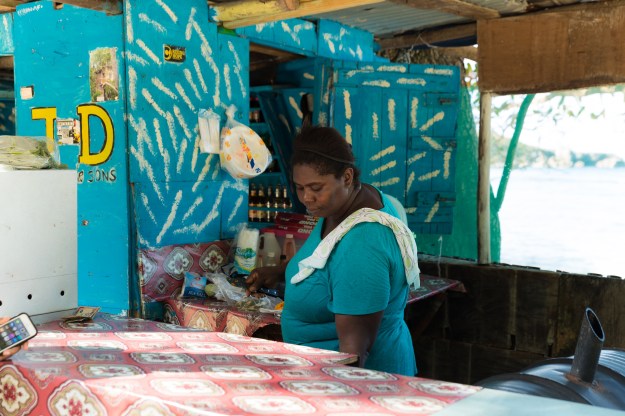
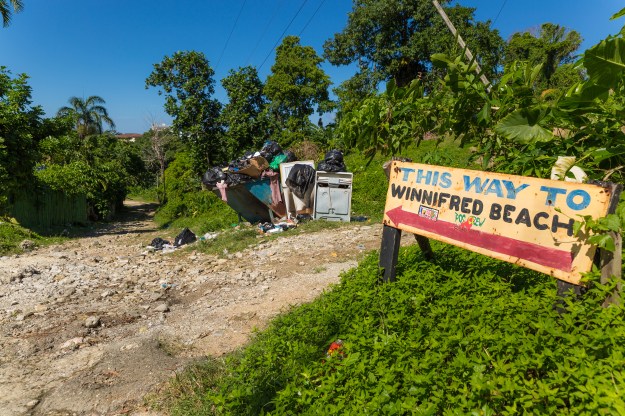
“I am 53. I am not doing it for me, but for the younger people coming up. It’s a pass-on thing; it is nothing to grab onto,” she declares.
The sun is setting. A stone’s throw away from Miller, Allen is packed and ready to leave. When pressed about how he survives on the sparse income he makes from selling on the beach, he explains that he does odd construction jobs. He also participated in the U.S. Farm Work & Hospitality program six times, cutting cane in Florida and landscaping in Maine before machines replaced him and his colleagues. He pinched those U.S. pennies, he says. He still has $200 from his last stint, in 2012. He also farms bananas and plantains for his mother (herself a former beach vendor), his sick wife, and his daughters, so the family doesn’t have to buy all their groceries.
He is hopeful. While he is “not so good on the reading,” his daughters, now grown, are literate and employed. One is a hairdresser, and the other does domestic labor in the Farm Work program.
“I was born and grow here, so I think this is the best place for me to achieve,” he smiles, exposing his white and gold teeth. “It keeps me going. I don’t know when I am going to make [money], so I just keep going.”